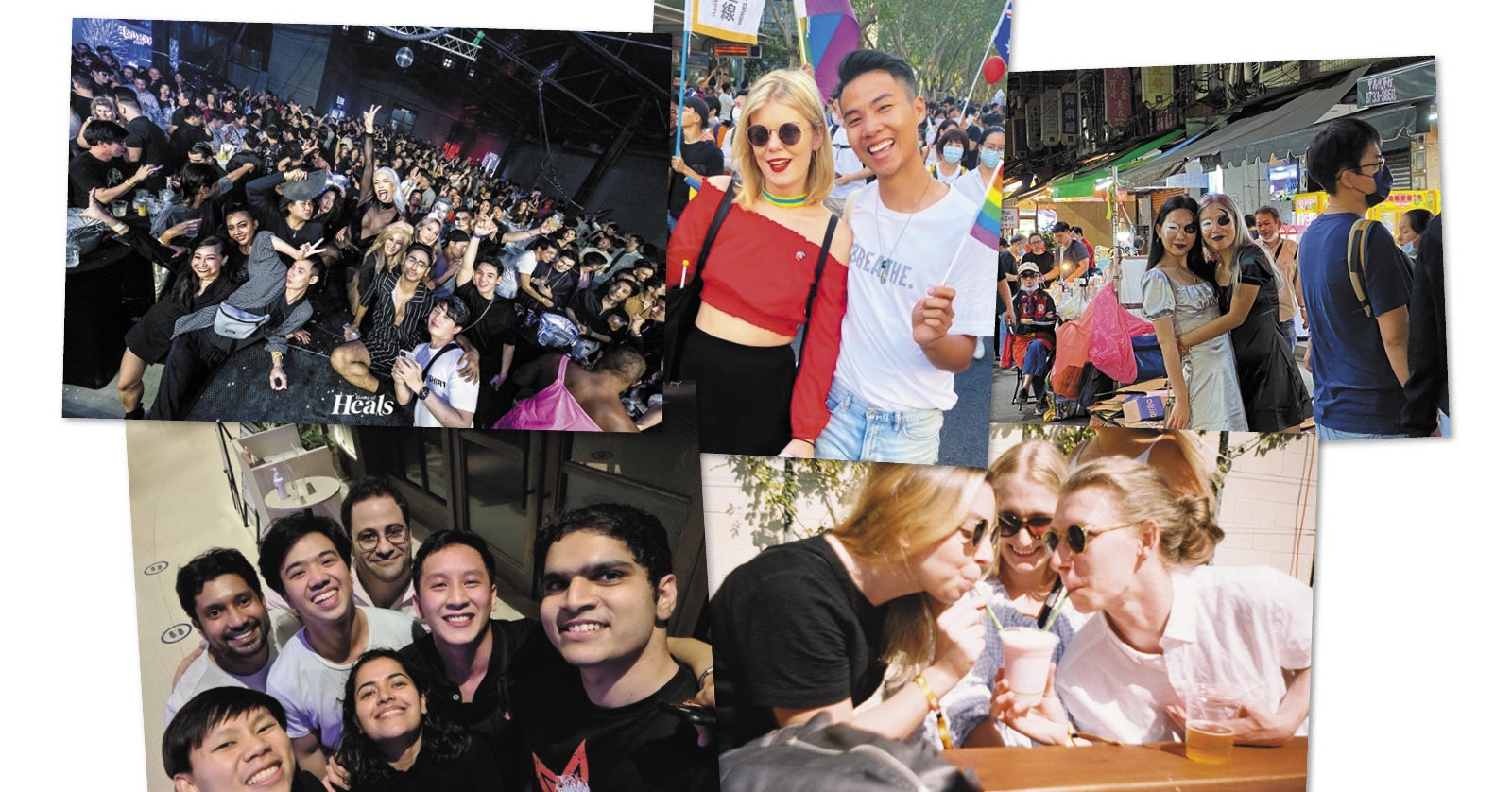Courtesy Karmen Truong, Perry Truong, Courtney Rodriguez, Pan Pan Narkprasert, and Jade Dhangwattanotai
Clockwise from prime: Karmen Truong in Taiwan on Oct. 31; Perry Truong in Taiwan throughout Pleasure on Oct. 31; Rodriguez and buddies in Perth on Sept. 4, Australia; Narkprasert’s bar in Thailand; Dhangwattanotai and buddies in Thailand on Sept. 25.
In New Zealand, individuals are going to malls with out masks and sharing popcorn with buddies in film theaters. In Australia, they’re watching live theater and sports activities and seeing bands perform at packed concerts. Thai individuals in Bangkok are consuming inside busy bars and dancing, whereas in Taipei, the Taiwanese capital, greater than 130,000 gathered for one of many only Pride parades to take place in person this year.
“Pleasure was big. There was a ton of individuals out,” mentioned Perry Truong, a 25-year-old English tutor who moved final 12 months from the US, the place there are at present nearly 200,000 new COVID-19 circumstances every day, to Taiwan, the place there hasn’t been a brand new regionally transmitted case of the coronavirus in more than 200 days. “It’s actually not in my thoughts in any respect,” Truong mentioned. “I don’t really feel anxious about catching the virus. I don’t really feel scared about not carrying a masks to public locations. For lack of a greater phrase, it’s actually regular.”
“It feels bizarre,” he added, “as a result of I really feel like when individuals discuss this in 10 years, they’ll be like, ‘Bear in mind the pandemic?’ and I’ll be like, ‘There was a pandemic?’”
Because the third surge of the pandemic devastates the US, the place overwhelmed hospitals are at present treating more than 100,000 patients with COVID-19 and deaths are climbing to record levels, many People are as soon as once more heading again into lockdowns. Whereas vaccinations are beginning for some, it is going to nonetheless be an extended and darkish winter for many. 9 months into the pandemic, our pre-COVID lives appear to be a distant reminiscence.
However in elements of the world, it’s the coronavirus that appears distant. Helped by geographic isolation or governmental response or each, infections are low to nonexistent in a number of nations, notably within the Asia Pacific, the place life seems to be virtually regular. Some individuals even often neglect there’s a pandemic happening.
Courtesy Annalise Hayman; Jade Dhangwattanotai
Left: Hayman and her youngsters attend an Australian guidelines soccer recreation in Perth on July 26, 2020. Proper: Dhangwattanotai and buddies inside a restaurant in Bangkok on Aug. 30, 2020.
“I really feel like there have been days I forgot there was a pandemic, particularly on days I wasn’t going out a lot, simply staying in my space,” mentioned Jade Dhangwattanotai, a 25-year-old software program developer in Bangkok.
“In my day-to-day life, sure, I do neglect. The concern has gone away in loads of methods,” mentioned Annalise Hayman, a 35-year-old mom of two in Perth, the capital of Western Australia that is without doubt one of the most geographically isolated cities in the world. That state has marked eight months without any cases of neighborhood transmission, and now Hayman doesn’t suppose twice about taking her youngsters to the playground or attending a crowded recreation of Aussie rules football. She has by no means been required to put on a face masks. She doesn’t even personal one. “I bear in mind feeling very panicked at first,” she mentioned, “however now I simply really feel anxious for different nations the place the circumstances maintain rising.”
In a traditional world, anecdotes about carefree individuals visiting eating places or planning crowded household Christmas lunches may not be noteworthy, however now they’re sufficient to induce beautiful jealousy from these in nations the place the pandemic remains to be raging. Tweets about moving to New Zealand are all of a sudden in every single place, as is the Squidward window meme from SpongeBob. In 2020, normalcy has change into newsworthy.
“Every thing is principally regular now,” mentioned Lucy Withers, a 28-year-old grocery retailer employee in Christchurch on New Zealand’s South Island, the place lockdowns ended in June. She hasn’t worn a face masks in months and now comfortably dines out at tables that aren’t spaced 6 toes aside. “I see my household; they arrive over; we exit for meals. It’s simply utterly regular.”
The return to normalcy in these fortunate nations — or as a lot as is feasible in a world pandemic — was not miraculous, however hard-won. In New Zealand, your complete nation endured one of many strictest and earlier lockdowns in March. In August, residents of Auckland, inhabitants 1.7 million, went again into lockdown for over a month after an outbreak there. The variety of new circumstances that prompted the shutdown? Simply 17. “Going onerous and early remains to be one of the best plan of action,” said Prime Minister Jacinda Ardern, who gained reelection in a landslide in October thanks partly on account of her dealing with of the disaster.
Australian officers, too, imposed a severe lockdown in the state of Victoria in June after a cluster emerged there, sparking a whole bunch of latest circumstances a day. It lasted greater than 100 days however the state has had zero new infections since the end of October.
“Lockdowns suck. You perceive why it’s vital, however it nonetheless takes an prolonged toll on individuals,” mentioned Chase Madsen, a 26-year-old artistic producer in Auckland, who attended a big household marriage ceremony final weekend after the virus was virtually eradicated as soon as once more. “Nonetheless, I believe you’d be hard-pressed to seek out anybody in New Zealand who thinks the lockdowns haven’t been value it, until they’re fairly fringe politically or naive.”
Different nations like Taiwan, Singapore, and South Korea by no means went into lockdown to tame the virus, as a substitute counting on a mixture of technological measures, similar to intensive contact tracing and testing, in addition to cultural practices, similar to generally accepted mask-wearing. “Even earlier than COVID, at any time when individuals had been unwell, simply as an additional precaution they might put on masks on buses and trains,” mentioned Karmen Truong, a 26-year-old digital marketer in Taipei, “so when COVID occurred, it wasn’t actually a difficulty.”
Courtesy Chase Madsen; Karmen Truong; Lucy Withers
From left: Madsen and buddies in Auckland on Nov. 6, 2020; Karmen Truong and buddies bathe at Yilan Hotsprings in Taiwan on Nov. 22; Withers together with her mom and boyfriend in Christchurch.
Geography additionally definitely performs a job. Island nations like New Zealand, Australia, Taiwan, and Singapore definitely have a better time controlling incoming worldwide arrivals. Hell, even South Korea’s solely land border is the demilitarized zone with the North. Maybe is that this nowhere extra clear than in American Samoa, one of many few locations on the earth — and the one US territory — to not have recorded a single COVID an infection. This was due largely to the governor’s resolution in late March to utterly shut off the island to outsiders. Even residents who had been abroad at the time can’t get back home.
“We’ve public occasions identical to regular,” mentioned Kelley Anderson Tagarino, a marine science professor on the College of Hawaii who has been based mostly in American Samoa for 12 years and who lately threw a primary birthday celebration for her little one. “All of the little children had been hanging out collectively taking part in within the pool, chasing one another, and the adults had been hanging out speaking, swimming, consuming beers, identical to typical. We hug. We will do all of the issues with no masks.”
Life just isn’t utterly regular, although. The faculty the place she teaches is brief on workers now (not less than one coworker is caught in California), and so they nonetheless maintain COVID drills, working towards carrying a masks for a virus that isn’t there. “It’s undoubtedly a really surreal expertise to see all of the horrible impacts which can be occurring all over the world, and simply all of the inequities which can be getting worse and worse,” she added. “I believe, for us right here, we really feel very fortunate to up to now be COVID-free.”
These nations nonetheless permitting individuals in are stopping any potential infections by way of strict resort quarantine packages. In Taiwan, a migrant employee from the Philippines was this week fined roughly $3,500 for stepping exterior of his room in an eight-second breach of the principles. In Australia, solely residents are permitted to enter the nation and should then spend 14 days locked in a room, unable to open a window, inside a resort patrolled by guards — a privilege for which the inbound vacationers are required to pay more than $2,200.
Journey between Australian states was additionally largely curtailed for months, particularly through the Victorian surge. Western Australia solely opened its borders this week after a nine-month closure, prompting tearful reunions at airports. “We’ve saved COVID out, defending individuals’s lives,” boasted the state’s chief, Mark McGowan. “And Western Australia’s economic system has roared again to life consequently, sooner than we ever anticipated.”
The US, after all, has no such restrictions. Many states mandated that incoming vacationers from areas with excessive an infection charges self-isolate for 14 days, however the patchwork of rules was little enforced in practice. (One main exception was Hawaii, the place vacationers had been arrested if found violating a two-week quarantine, though this was later loosened). On the federal stage, President Donald Trump restricted journey from China in February (after most airways had already suspended flights) and Europe in March, however loopholes nonetheless allowed scores of individuals to return and filter again into their communities.
In evaluating the US to Australia, the Washington Post this week concluded the optimistic scenario Down Underneath was due partially to the virus being largely depoliticized there, in addition to Australians’ relative “willingness to adapt” and place extra belief in authorities, an perspective developed partly by way of a system of mandatory voting. However Natasha Matthews, a senior lecturer in psychology on the College of Queensland (UQ) at present planning an enormous household Christmas celebration in Brisbane, doesn’t imagine it’s that straightforward.
“I’d say Australians are fairly skeptical of presidency. Politicians aren’t thought of wonderful individuals. Everybody rolls their eyes speaking about them,” she mentioned. “It’s not that we had been making the sacrifices for Australia; we’re doing it for one another. We weren’t doing it as a result of we thought it could please the federal government. We had been doing it as a result of it could please one another.”
There are lingering indicators of the pandemic. When Matthews visits the put up workplace, individuals nonetheless wait in line 6 toes aside and she or he is considerably cautious. Programs on the college are nonetheless being taught on-line the place potential and folks sit farther aside in parks, however metropolis life in Brisbane has resumed. Queensland Theatre, Australia’s third-largest theater firm, is staging performs as soon as once more, though administrators are discovering artistic workarounds so actors don’t need to work together intently for lengthy durations. “Until you had been actually in search of it, you couldn’t inform it was being produced in COVID instances,” mentioned UQ drama lecturer Chris Hay, who has seen two performs since rising from lockdown.
“By way of the way in which the world is trying right here, definitely in Queensland, I believe you’d be hard-pressed to inform the distinction between this 12 months and final,” Hay added. “There’s barely extra consciousness of boundaries, of peripheries, however they’re the type of factor that Australians didn’t have anyway.”
Whereas People could also be trying to these nations with envy, they’re trying again in horror. The spiraling scenario right here is large information for individuals there, as they wrestle to make sense of America’s distinctive tradition and politics. “I really feel much less important of the entire scenario [in America] as a result of I do know there’s in all probability cultural variations within the US and individuals are extra free-minded,” mentioned Dhangwattanotai, the Bangkok software program developer. “However I hear my buddy within the US say that some individuals don’t imagine it’s a factor or that it’s not that severe or they’ll get it and recuperate and it’s fantastic. I believe that’s insane.”
“I believe we simply don’t get it,” mentioned Hayman, the Perth mom. “Possibly as a result of we don’t have fun Thanksgiving, however simply the concept of touring throughout the nation and assembly in these large teams when it’s simply such a disastrous scenario — the concept it’s all about your self: ‘I wish to do this and I wish to see my household!’ Effectively, we haven’t seen our buddies or household from different states for nearly a 12 months. It’s a bit like, What are you doing? Why would you set different individuals in danger like that? It’s mind-blowing.”
Despite the fact that these nations have largely averted a public well being disaster, they’re nonetheless struggling the identical international results of the virus. Australia has entered its first recession in 29 years, and the loss of international travelers has devastated economies in the region that depend on tourism. Dhangwattanotai’s firm, a web-based journey company, went by way of a number of rounds of layoffs, and buddies of his misplaced their jobs. He wears a masks on the practice, as is required, however not within the workplace, the place desks are extra spaced out now.
Karmen Truong, the digital marketer, has additionally been going into her Taipei workplace, the place she has her temperature taken upon entry. As a result of they by no means went into lockdown there, her firm by no means had to determine new methods of working, which makes her nearly jealous of her family and friends again within the UK. “Possibly all this working from house and utilizing Zoom a lot is a part of the digital revolution that we’ve missed as a result of we’ve by no means needed to do it,” she mentioned.
However new alternatives have additionally arisen. Pan Pan Narkprasert mentioned individuals in Bangkok thought he was naive to open a brand new bar with drag queen performances through the pandemic. Bars catering to vacationers have struggled, however he had religion the locals would come and now enterprise is booming. “We had been in lockdown for round three months, so as soon as we got here out of it everybody was in a postwar feeling, dancing and having the time of their lives,” he mentioned. “Folks missed primary human interplay.”
Courtesy Pan Pan Narkprasert; Courtney Rodriguez
Left: A drag queen efficiency at Narkprasert’s bar in Bangkok. Proper: Rodriguez and buddies at a bar in Perth on July 31.
Whereas closing borders is an efficient method to maintain the virus out, it may additionally really feel troublesome being minimize off from the world, particularly so for these with family members overseas. In American Samoa, Anderson Tagarino worries for her household in Florida and for these together with her on the island. Many can’t see their family members in close by unbiased Samoa, which recorded its very first infection last month. “Regardless of being among the many previous couple of COVID-free locations on the earth, individuals had been having to observe their family members die from a telephone as a result of they’ll’t go see them,” she mentioned.
Courtney Rodriguez, a 33-year-old Canadian residing in Perth together with her husband, feels blessed she’s by no means needed to put on a masks, however misses her household again in Ottawa. “It is a very unusual method to be as a result of your mind is in a number of totally different locations,” she mentioned. “Despite the fact that Perth is house, clearly we’ve an enormous chunk of our hearts and minds again with our household again house. It’s like being in two worlds.”
When she speaks with these again in Canada, at present grappling with a deadly second wave, she needs to be cautious about what she says — keep away from mentioning the get together you went to or the soccer recreation with buddies or the journey to the flicks to see Happiest Season. “You do that very unusual survivor’s guilt,” she mentioned, “particularly whenever you’re speaking to household and buddies again in your hometown who’re going again into lockdown and carrying masks.”
Buddies ask Perry Truong, the English tutor in Taiwan, about his household again within the US, however even he can’t wrap his head round what life have to be like there. “They’ve bought hundreds of thousands of circumstances and we’ve had zero circumstances of regionally transmitted ailments,” he mentioned. “I’m up to now eliminated I can’t even empathize with what that looks like in America proper now.”
“I really feel like I’m trying again in time with all these individuals,” he mentioned. “I really feel like I’m sooner or later, and I’m trying again in any respect the individuals nonetheless struggling.” ●








